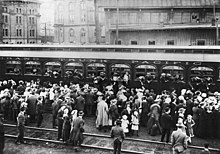History of Canadian foreign policy
[2] The British North American colonies which today constitute modern Canada had no control over their foreign affairs until the achievement of responsible government in the late 1840s.
[5] Notably, the borders between Canada and the United States were officially demarcated;[5] all land south of the Great Lakes, which was formerly a part of the Province of Quebec and included modern-day Michigan, Illinois and Ohio, was ceded to the Americans as the Northwest Territory.
[5] Britain ignored part of the treaty and maintained their military outposts in the Great Lakes areas it had ceded to the U.S., and they continued to supply their Native American allies with munitions.
Although the British government was concerned about this nascent Canadian diplomacy, it finally consented to giving Galt the formal title of High Commissioner in 1880.
Since Ottawa was reluctant to become involved, the Governor General of Canada privately raised 386 voyageurs at Britain's expense to help British forces on the Nile river.
However, when the US finally declared war on Germany in April 1917, there was swift cooperation and friendly coordination, as one historian report: Official co-operation between Canada and the United States—the pooling of grain, fuel, power, and transportation resources, the underwriting of a Canadian loan by bankers of New York—produced a good effect on the public mind.
[21] The Liberals regained their influence after the war under the leadership of William Lyon Mackenzie King, who served as prime minister with three separate terms between 1921 and 1949.
[22] As its reward for significant contributions to the victory, Prime Minister Sir Robert Borden won London's approval that Canada be treated as a separate signatory to the Treaty of Versailles.
The Conservative Party, under prime ministers Robert Borden and Arthur Meighen, called for close cooperation with London as part of the British Empire.
However the Liberal Party, under its new leader Mackenzie King, sought a nationalistic and isolationist approach of the sort that appealed to the French Canadian element, as well as other non-British ethnic groups.
King, acting as his own Foreign Minister, achieved his goal by close cooperation with his Under-Secretary of State for External Affairs, Oscar D. Skelton, and with Clifford Sifton, the influential newspaperman from Manitoba.
[24] Both the Borden and King governments made it clear that "Canada lived 'in a fireproof house far from flammable materials' and felt no automatic obligation to the principle of collective security".
Instead, King focused his attention on good relations with the United States and on greater independence from Great Britain, moving into a position of near isolation.
Thus, in 1922 King refused to support the British to enforce a peace settlement during the Chanak Crisis, when the revolutionary Government of the Grand National Assembly attacked and drove out the Greeks in Turkey.
[26] The government operated a Canadian War Mission in Washington, 1918 to 1921, but it was not until King became Prime Minister in 1921 that Canada seriously pursued an independent foreign policy.
[citation needed] Canada was pulled into the Great Depression in 1929 by the economic recession in the U.S.[28] There was a tariff war with Washington and foreign trade dried up[29] while unemployment soared.
[33] With the rise of anti-Semitism in Germany and the growing trickle of refugees arriving in the country, Canada began to actively restrict Jewish immigration by 1938.
King himself shared the anti-Semitism of many Canadians; in his diary he wrote: "We must seek to keep this part of the continent free from unrest and from too great an intermixture of foreign strains of blood.
While Canada hosted two major Allied conferences in Quebec in 1943 and 1944, neither Prime Minister Mackenzie King nor senior generals and admirals were invited to take part in any of the discussions.
CIIA leaders and Canadian officials worked to encouraged nationalist forces in India, China, and Southeast Asia that sought to reject colonial rule and Western dominance.
[39] According to Hector Mackenzie, the myth of a glorious postwar era in Canada's international relations is common in memoirs and biographies of Canadian diplomats, journalism and popular commentary.
[43] Ties with Great Britain gradually weakened, especially in 1956 when Canada refused to support the British and French invasion of Egypt in order to seize the Suez Canal.
"[47] The general pattern in the 20th century, was for the Liberal party, especially when it controlled the government under Laurier (1896–1911) and Mackenzie King (1921–1930, 1935–1948), to favour closer ties with the United States, often at the expense of Great Britain and the British Commonwealth.
Thus the Conservatives defeated the 1911 reciprocity treaty with the United States, and took the lead in supporting Britain in the First World War, wild working feverishly to suppress anti-British sentiment in Québec and the Prairie provinces.
French President Charles de Gaulle vetoed London's application, but it finally joined in 1975, with the result of weakening ties to Canada and the Commonwealth.
[52] Canada sent a peacekeeping force to Cyprus in 1964, when two NATO members, Greece and Turkey, were at swords' point over ethnic violence between Greeks and Turks in the historic British colony.
Trudeau recognized the People's Republic of China shortly before the United States did,[63] improved relationships with the Soviet Union, and cut back on contributions to NATO.
By his third year in office, however, Trudeau launched a new initiative, emphasizing Canada's role as a middle power with the ability to engage in active peacekeeping operations under the auspices of the United Nations.
[69] The Conservative Party Government of Canada led by Prime Minister Stephen Harper has been characterized as a great break from the previous 70 years of post-war Canadian diplomacy.
[88][89] According to the Norman Paterson School of International Affairs expert, "To my mind, this is one of the first public examples of evidence of clandestine foreign influence targeted at Canadian politicians.


